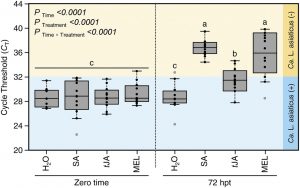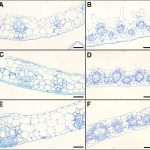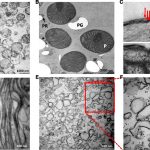On the Inside: Citrus Greening Disease and Melatonin
 Melatonin has diverse effects on plant growth and development and has been implicated in tolerance to abiotic stresses such as drought, salinity, freezing, and high temperature. The protective role of melatonin against biotic stresses in plants, however, remains unclear. Huanglongbing (HLB), popularly known as citrus greening disease, was first noted in China in the early 20th century. The disease is associated with a species of phloem-restricted α-Proteobacteria, Candidatus Liberibacter asiaticus. In Asia, HLB is transmitted by a phloem-feeding insect vector, the Asian citrus psyllid Diaphorina citri, and is considered the most destructive disease of citrus in the world. Nehela & Killiny (10.1104/pp.20.00393) have used metabolomic and transcriptomic approaches to investigate the potential role of melatonin in citrus response against HLB and to understand the relationships between melatonin and the stress-associated phytohormones at molecular and metabolic levels. Ca. L. asiaticus infection and D. citri infestation significantly increased endogenous melatonin levels in Valencia sweet orange (Citrus sinensis) leaves and upregulated the expression of its biosynthetic genes. However, infection with Ca. L. asiaticus had a greater effect than did infestation with D. citri alone. The enhanced production of melatonin by infection was positively correlated with salicylic acid but not trans-jasmonic acid content. The addition of melatonin also enhanced the endogenous contents of various stress-associated phytohormones, including salicylates, auxins, trans-jasmonic acid, and abscisic acid, as well as the transcript levels of their biosynthetic genes. Melatonin supplementation also diminished the Ca. L. asiaticus titer within the infected leaves, which suggests that melatonin might play an antibacterial role against this bacterium and gram-negative bacteria in general. These findings provide a better understanding of the melatonin-mediated defensive response against HLB via modulation of multiple hormonal pathways. Understanding the role of melatonin in citrus defense to HLB may provide a novel therapeutic strategy to mitigate the disease.
Melatonin has diverse effects on plant growth and development and has been implicated in tolerance to abiotic stresses such as drought, salinity, freezing, and high temperature. The protective role of melatonin against biotic stresses in plants, however, remains unclear. Huanglongbing (HLB), popularly known as citrus greening disease, was first noted in China in the early 20th century. The disease is associated with a species of phloem-restricted α-Proteobacteria, Candidatus Liberibacter asiaticus. In Asia, HLB is transmitted by a phloem-feeding insect vector, the Asian citrus psyllid Diaphorina citri, and is considered the most destructive disease of citrus in the world. Nehela & Killiny (10.1104/pp.20.00393) have used metabolomic and transcriptomic approaches to investigate the potential role of melatonin in citrus response against HLB and to understand the relationships between melatonin and the stress-associated phytohormones at molecular and metabolic levels. Ca. L. asiaticus infection and D. citri infestation significantly increased endogenous melatonin levels in Valencia sweet orange (Citrus sinensis) leaves and upregulated the expression of its biosynthetic genes. However, infection with Ca. L. asiaticus had a greater effect than did infestation with D. citri alone. The enhanced production of melatonin by infection was positively correlated with salicylic acid but not trans-jasmonic acid content. The addition of melatonin also enhanced the endogenous contents of various stress-associated phytohormones, including salicylates, auxins, trans-jasmonic acid, and abscisic acid, as well as the transcript levels of their biosynthetic genes. Melatonin supplementation also diminished the Ca. L. asiaticus titer within the infected leaves, which suggests that melatonin might play an antibacterial role against this bacterium and gram-negative bacteria in general. These findings provide a better understanding of the melatonin-mediated defensive response against HLB via modulation of multiple hormonal pathways. Understanding the role of melatonin in citrus defense to HLB may provide a novel therapeutic strategy to mitigate the disease.



